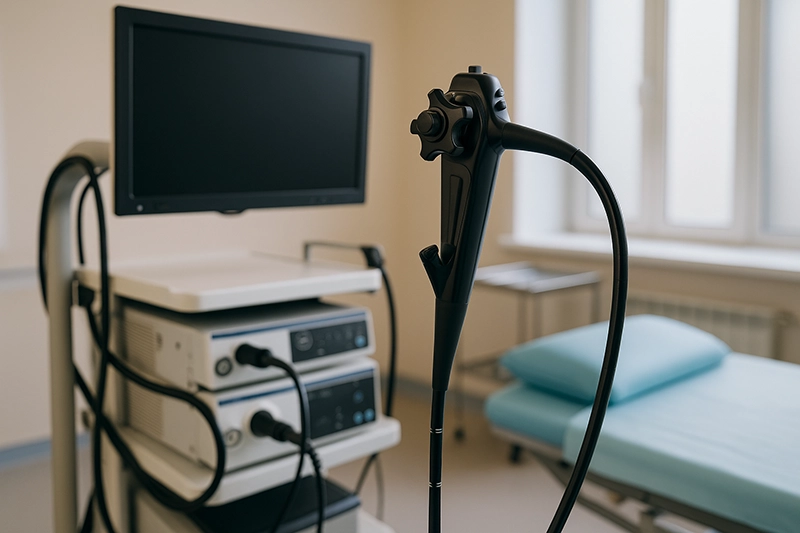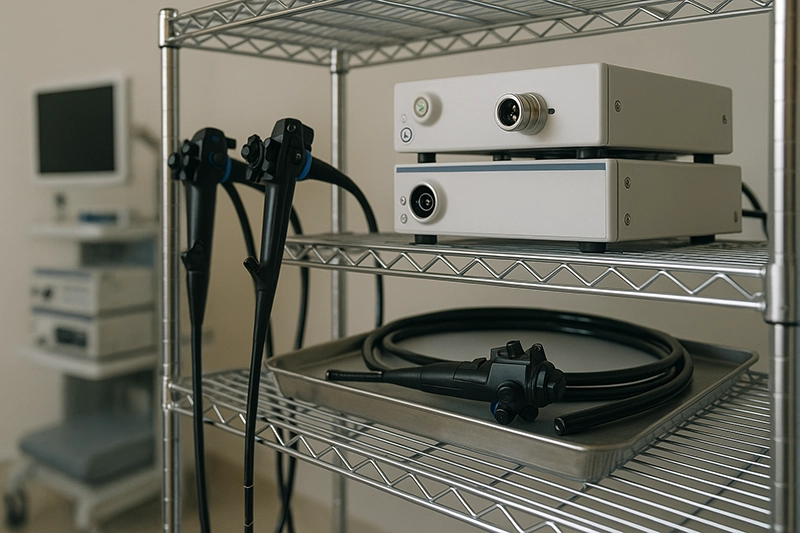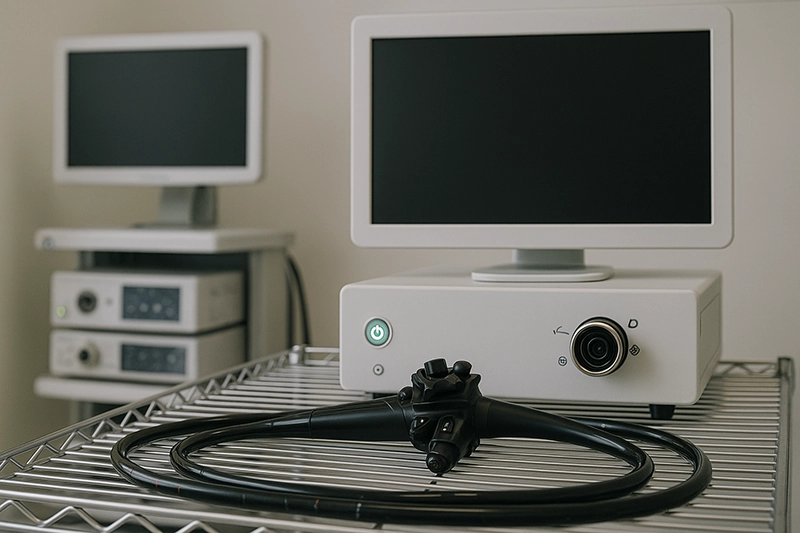Table of Contents
Colonoscope manufacturers play a critical role in the global medical device industry, supplying hospitals, clinics, and diagnostic centers with advanced equipment for the detection and treatment of colorectal diseases. In 2025, the market is defined by rapid technological progress, rising demand driven by public health challenges, and competitive strategies among global colonoscope suppliers and colonoscope factories. This article explores the key factors shaping the industry, the competitive landscape, market trends, and the outlook for the years ahead.
Colonoscope manufacturers specialize in designing, producing, and distributing endoscopic systems that allow doctors to examine the large intestine and rectum with precision. These devices combine imaging, illumination, and accessory channels to enable both diagnostic and therapeutic procedures.
By 2025, colonoscope manufacturers are adapting to increasing demand worldwide, especially in regions with high prevalence of colorectal cancer. Hospitals and procurement teams increasingly rely on trusted colonoscope suppliers to ensure they receive reliable products that meet strict regulatory standards. The role of the colonoscope factory has also expanded, with OEM/ODM manufacturing supporting customized production for global markets.
The industry has become more competitive, with manufacturers striving to differentiate through innovation, affordability, and compliance with international certifications.
The rise of colorectal cancer remains a primary factor behind the demand for colonoscopes. According to global health statistics, millions of people undergo screening each year, and early detection significantly improves patient outcomes. Colonoscope suppliers are therefore under constant pressure to meet this growing demand with high-quality, affordable products.
Public health campaigns, national screening programs, and hospital procurement strategies all contribute to a steady increase in purchases from colonoscope manufacturers.
In 2025, technological progress is a defining feature of the industry. Colonoscope factories are investing heavily in research and development, introducing:
High-definition imaging that enhances diagnostic accuracy.
Artificial intelligence (AI) integration for real-time polyp detection.
Disposable colonoscopes for infection control.
Ergonomic designs that improve usability for medical staff.
Colonoscope manufacturers must operate within a highly regulated environment. ISO standards, CE marking, and FDA approvals are essential for gaining access to major markets. Hospitals and distributors prefer working with certified colonoscope suppliers who can provide compliance documentation, warranties, and after-sales service.
By 2025, adherence to international standards has become a key competitive advantage, ensuring manufacturers maintain trust among healthcare buyers.
The global colonoscope market is concentrated among major manufacturers in Asia-Pacific, North America, and Europe.
Asia-Pacific colonoscope factories in China, Japan, and South Korea have rapidly increased production, offering competitive pricing and scalable OEM/ODM options.
North American manufacturers focus on high-end innovations, particularly in digital imaging and AI.
European colonoscope suppliers emphasize quality, durability, and regulatory compliance.
In addition to established players, smaller colonoscope factories and suppliers are entering the market with innovative business models. Startups in medical technology are leveraging flexible manufacturing, niche specializations, and international partnerships.
OEM and ODM collaborations have become particularly attractive, as hospitals seek tailored solutions to fit their clinical workflows.
Hospitals increasingly evaluate colonoscope suppliers based on cost efficiency. Competitive bidding, bulk purchasing, and leasing models are now common strategies. Colonoscope manufacturers that can offer flexible financial terms, including long-term service agreements, are more likely to secure international contracts.
Supply chain dynamics remain a challenge for colonoscope factories worldwide. Rising raw material costs, shipping delays, and post-pandemic disruptions affect delivery schedules. Manufacturers are responding with regional distribution hubs and partnerships with local colonoscope suppliers to ensure reliable delivery.
Sustainability has become an important consideration in procurement decisions. Colonoscope manufacturers are increasingly adopting eco-friendly production methods, recyclable packaging, and energy-efficient designs. Hospitals prefer suppliers who demonstrate responsibility toward environmental goals while ensuring cost savings.
North American colonoscope suppliers are known for advanced technology and strong R&D pipelines. Demand is high due to government-supported screening programs, private healthcare expansion, and investment in early cancer detection.
European hospitals prioritize certified products, strict compliance, and long-term supplier partnerships. Colonoscope manufacturers in Europe emphasize product safety and after-sales support, aligning with public healthcare systems.
Asia-Pacific remains the fastest-growing market. Colonoscope factories in China and Japan are leading exporters, benefiting from cost advantages and government incentives. Domestic demand is also rising due to increasing awareness of colorectal health.
These regions represent emerging opportunities for colonoscope manufacturers. While adoption rates are slower, infrastructure development and international partnerships with colonoscope suppliers are expanding access.
Despite positive growth, colonoscope manufacturers face several challenges:
Price competition: Hospitals demand affordable solutions, putting pressure on margins.
Innovation vs. affordability: Balancing high-tech features with cost efficiency is a constant challenge for colonoscope factories.
Alternative technologies: Capsule endoscopy and AI-based imaging solutions are emerging as competitors, pushing colonoscope manufacturers to innovate further.
By 2030, the colonoscope market is expected to expand significantly, driven by global health initiatives and the continued rise of colorectal cancer screening. Colonoscope suppliers will integrate more AI features, improve ergonomics, and expand the use of disposable devices.
Digital healthcare ecosystems, including remote diagnostics and tele-endoscopy, are also creating new opportunities. OEM/ODM partnerships will remain central, allowing colonoscope factories to serve both local and international buyers with flexible solutions.
For hospitals and procurement managers, selecting the right colonoscope manufacturer or colonoscope supplier is a strategic decision. Trusted partners provide:
Certified equipment that ensures patient safety.
Strong after-sales support and training.
Customization options from colonoscope factories to meet departmental needs.
Long-term cost efficiency through reliable product performance.
Choosing a reliable colonoscope manufacturer ensures not only the quality of medical devices but also the stability of hospital operations and patient outcomes.
The colonoscope manufacturing industry in 2025 is dynamic, competitive, and essential for modern healthcare. With demand driven by public health needs, innovation, and global supply chain adjustments, colonoscope manufacturers, colonoscope suppliers, and colonoscope factories will continue to play a crucial role in shaping the future of endoscopy worldwide.
Ask for ISO13485, CE Marking, and FDA clearance. Certified colonoscope manufacturers and colonoscope suppliers ensure compliance, patient safety, and smooth import/export procedures.
Yes, many colonoscope factories specialize in OEM/ODM services, allowing hospitals to customize equipment features, packaging, and branding for procurement flexibility.
Reputable colonoscope suppliers conduct strict quality inspections, batch testing, and provide warranty support to guarantee consistency in large-scale procurement.
Pricing is shaped by technology level, disposable vs. reusable models, certifications, and after-sales service agreements. Colonoscope manufacturers also consider raw material and logistics costs.
Delays in raw material supply and international shipping may extend lead times. Trusted colonoscope manufacturers and regional suppliers reduce risks through local warehousing.
Hospitals should receive technical training, spare parts supply, software updates, and 24/7 support from colonoscope suppliers to ensure long-term reliability.
Copyright © 2025.Geekvalue All rights reserved.Technical Support:TiaoQingCMS